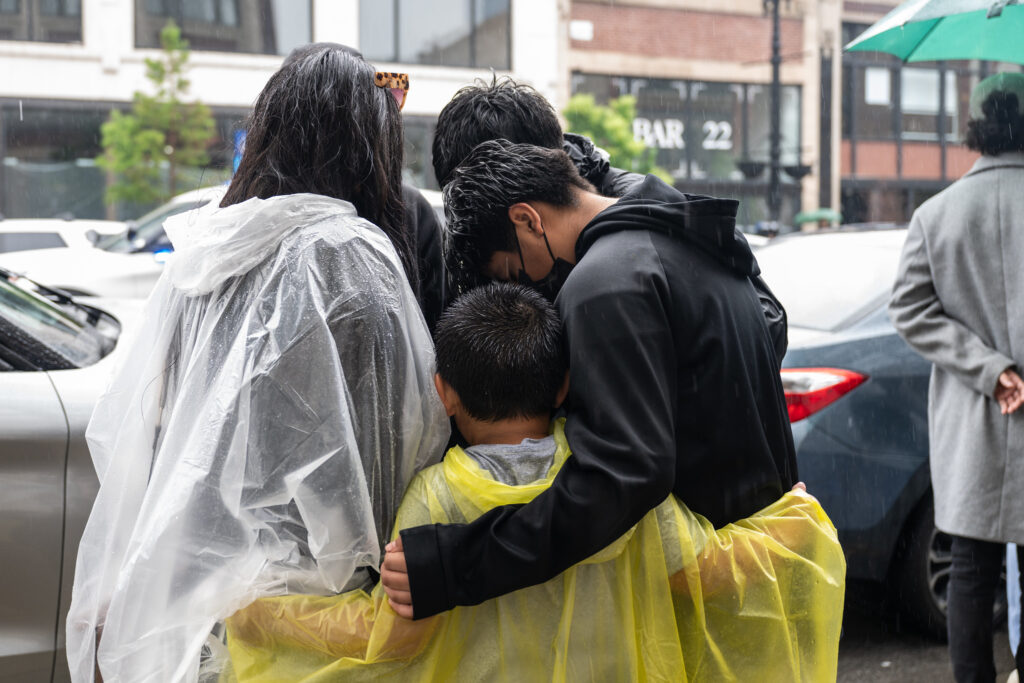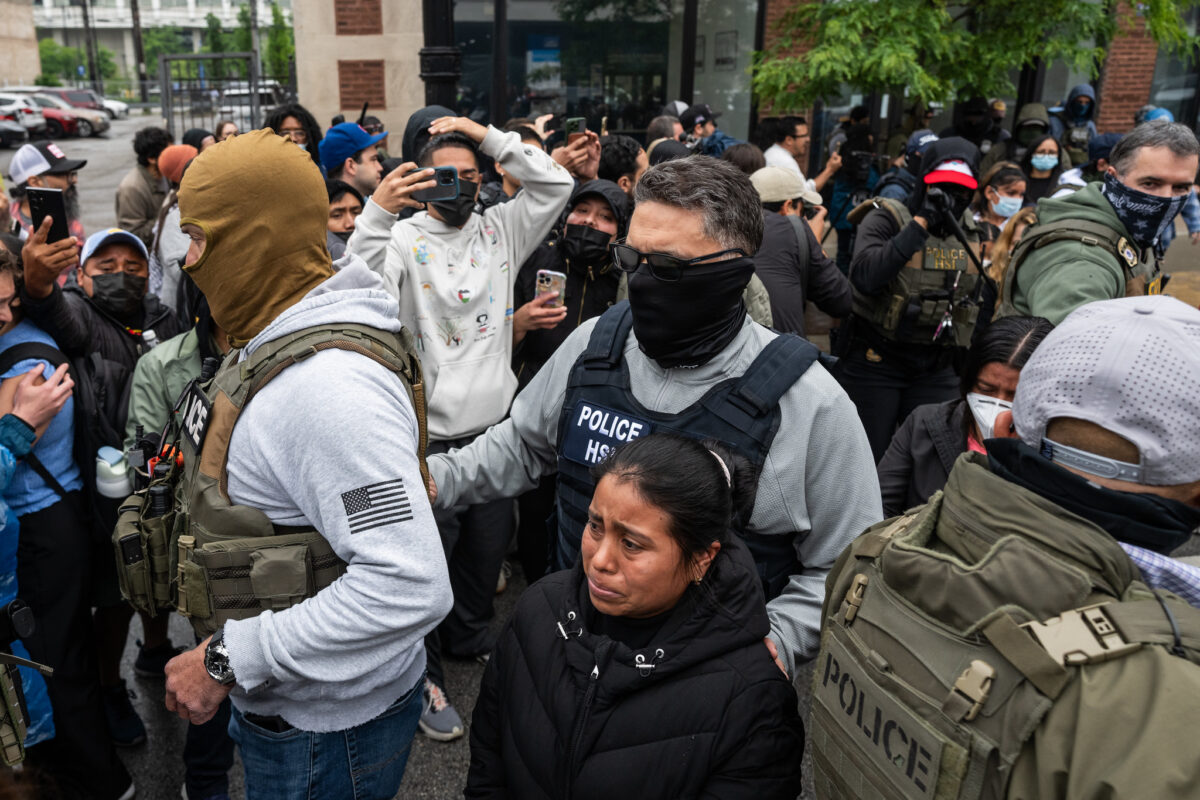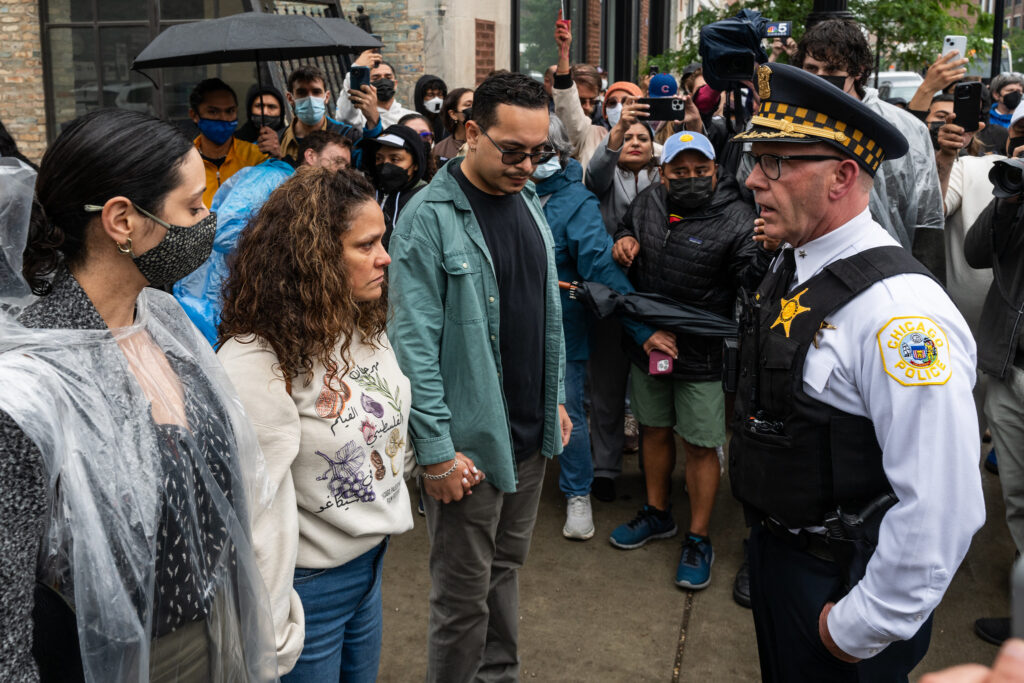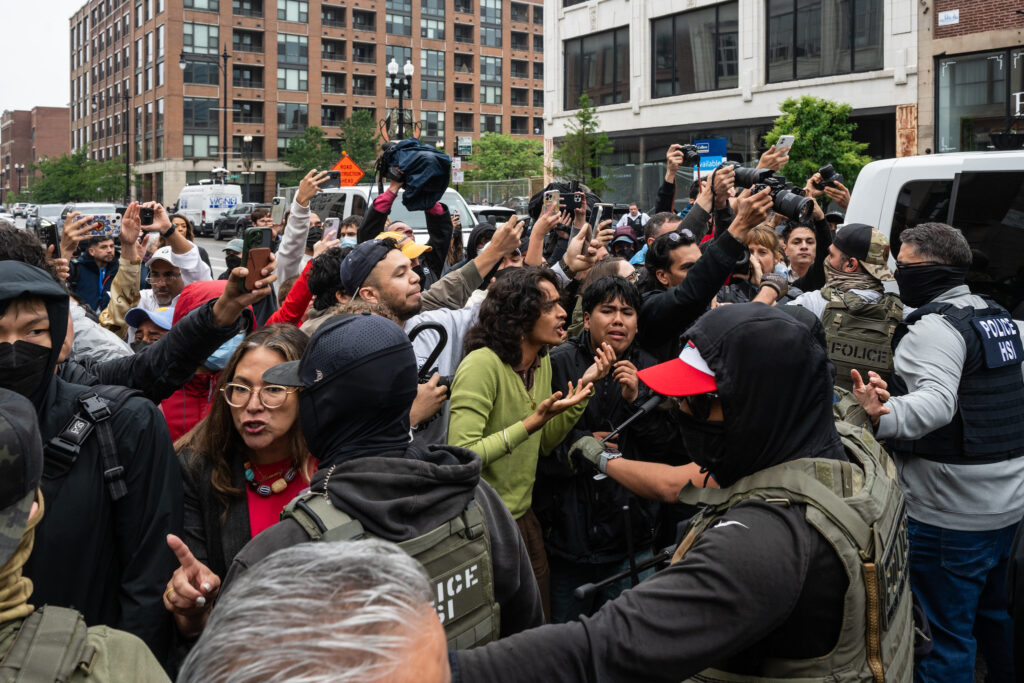On the morning of Wednesday, June 4, immigrants arrived at the Intensive Supervision Appearance Program (ISAP) office in Chicago’s South Loop after they received an unexpected notice to appear for a check-in appointment. Apparently, it was a trap.
These ten people, who had been complying with ICE surveillance, according to advocates and attorneys, were detained on the spot by U.S. Immigration and Customs Enforcement’s (ICE) officials in what witnesses described as a chaotic scene.
ISAP, an alternative to immigration detention, is managed by private contractors under the oversight of ICE. It requires individuals in deportation proceedings to comply with strict monitoring conditions such as ankle bracelets, phone surveillance, and regular in-person check-ins while people remain in the community as their case progresses.
Attorneys from Beyond Legal Aid and members of Organized Communities Against Deportations (OCAD) who accompanied clients that day said ICE agents broke from usual protocol by denying them entry to provide legal support or interpretation. Individuals arriving for their check-ins were handcuffed without warning, according to witnesses and organizers.
Advocates and elected officials positioned themselves in front of building exits to keep ICE from taking those they detained. Some family members cried as they were separated from their loved ones. Others scrambled to understand what was happening as ICE officers moved quickly to remove those they detained, placing them into unmarked vans and taking them away.
As the crowd of demonstrators grew, the Chicago Police Department was called and conducted crowd control.
“We’re all watching as constitutional rights are routinely violated, there is no due process and everybody deserves due process under the Constitution.”
Ald. Rossana Rodríguez Sánchez
Word of the detentions spread fast. Later that week, on June 6, supporters gathered at the Broadview Processing Center, in Broadview Illinois, where immigrants were taken. Activists and family members demanded the release of those taken and to raise awareness about what they call a deceptive and unjust enforcement tactic.
There were no signs, no official markings, nothing to indicate that this was where ICE processed people after an arrest before transferring them to out-of-state detention centers. Masked men in unmarked white vans and black sedans moved in and out through a barbed-wire gate nearby.
“We are here to demand the liberation of Gladis Yolanda Chavez Pineda,” said Antonio Gutierrez, member of OCAD. “And for the liberation of everyone who has been detained and who are presently in the building behind me,” he said.
Chavez Pineda, a mother and organizer with OCAD, is one of the ten individuals that were detained during routine check-ins at the ISAP office on June 4.
According to AJ Johnson Reyes, attorney and part of Cahvez Pineda’s legal team with Beyond Legal Aid, Chavez Pineda received a last minute notice to appear for an appointment the Monday before, June 2, via the ISAP app on her phone that she used to do weekly video calls as part of her ISAP check-ins.
Gutierrez said it was “odd” because she had just shown up at an appointment two weeks ago and had been fully compliant with her check-ins.
Chavez Pineda was detained that day and was not able to be located for two days. According to officers at the processing center, they had not been able to keep up with updating their records because of the number of detentions that had occurred over the span of two days, said Chavez Pineda’s legal team after being let in to see Chavez Pineda.
This new enforcement tactic comes as the Trump administration set goals for ICE to make an increasing number of daily arrests. These heightened enforcement actions that include the deployment of the National Guard in California and threats by the administration to deploy them in Illinois, contributed to sparking mass protests across the country demanding an end to deportations and detentions.
33rd ward Alderperson, Rossana Rodriguez-Sanchez, witnessed the ICE enforcement actions on June 4 and spoke out against ICE’s tactics that resulted in Chavez Pineda, a constituent and neighbor, being detained.
“It’s very important to point out that constitutional rights are being violated right now. We’re all watching as constitutional rights are routinely violated, there is no due process and everybody deserves due process under the Constitution,” Rodriguez-Sanchez said.
ICE claimed the ten individuals they detained at ISAP had final orders of removal, meaning an immigration judge has determined a non U.S. citizen must leave the country. However, Xanat Sobrevilla from OCAD said otherwise.
“It’s a lie. The people here are all not in final orders of removal. They are folks that were complying. They are not the people they are trying to paint,” she said.
ICE did not respond to the Weekly’s requests for comment.
Chavez Pineda arrived from Honduras with her daughter ten years ago seeking refuge and has been in the process of seeking asylum for many years.
About two months ago, Chavez Pineda was randomly scheduled for a check-in. Attorneys and a group of about fifteen people came to that appointment in support of Chavez Pineda, thinking she could be detained. She was not detained that day, but an ankle monitor was placed on her.
According to Reyes, Chavez Pineda has no criminal convictions and has complied with her check-in appointments and surveillance requirements since 2017. At the time she was detained during her ISAP check-in, she had an appeal pending.
Her lawyers attempted to deliver a copy of the stay of removal issued by the Seventh Circuit Court of Appeals on Thursday to pause her deportation to officials at the processing center as they pushed for her release.
A stay of removal was also submitted to ICE but was still pending. Without ICE’s approval, Chavez Pineda could not be released even though the Seventh Circuit had already granted a stay.
“When making this request today, we were told that the officers at this building no longer have the leeway nor the discretion to release individuals. That all those requests must go through headquarters,” Reyes said.
No additional guidance was provided for how to contact headquarters, according to attorneys.
Nadia Singh, a staff attorney at Beyond Legal Aid, said it took about twenty minutes to get let inside the Broadview processing center after being told to ring a doorbell that they could not find. When they were let in, they were given a moment to see Chavez Pineda.
“We were not allowed to give her a hug. We had to stand at least ten feet back. She was in handcuffs. She wanted to give her appreciation. When she started speaking about her daughter, she started crying,” Singh said.

Lawyers and advocates reported to the media the overcrowded conditions Chavez Pineda and others were experiencing at the ICE processing center, sharing that there were no beds, just chairs.
Chavez Pineda’s legal team believes the order of stay granted by the seventh court, along with the stay filed with ICE that was pending, should have been enough to release Chavez Pineda. However, conversations with officials at the processing center suggested there were additional layers of bureaucracy and backlog processing that may not have made it possible.
Despite that Chavez Pineda has been living in the U.S. for over a decade, has sole custody of her daughter, and has complied with court-related mandates, she was deemed a flight risk, put on an ankle monitor, and subsequently detained, according to Singh.
“A huge part of what’s going on is we are not seeing any legality or rationality in ICE’s choices of enforcement right now. It’s very much just, if we feel like we have some sort of way to deport them, we will,” Singh said.
As the press conference came to a close, advocates and supporters stayed as they received word that ICE was picking people up from the processing center and taking them to an undisclosed location.
Broadview police officers and vehicles patrolled up and down Beach St. and stood in front of the processing center entrance, as well as near the gated fence. When asked by advocates why it appeared that Broadview Police were helping or working with ICE, officers said they were conducting traffic control.
Inside the gated fence, dozens of detained individuals were seen walking out of the processing center, filed in a single line and walking towards unmarked white vans idled in the parking lot.
Supporters outside of the gate shouted, ‘No están solos, aquí estamos!’ (You are not alone, we are here).
About seven to eight vans driven by masked ICE officers, each carrying ten to twelve people, drove out through the gate and onto the clear path Broadview police secured for them. As those unmarked vehicles drove off, more came into the processing center with newly detained people.
The press conference and show of support for Chavez Pineda and others detained at the processing center ended without her release.
”She did have a message to share,” said Reyes. “She wanted to share her thanks and appreciation for all the support for herself and her family and to everyone here today. That’s about as much as she was able to give before losing composure.”
After days of uncertainty following last Friday’s rally, ICE updated its locator tool on Monday, confirming that Chavez Pineda is being held at Grayson County Jail in Kentucky.
OCAD organized a call to action and began collecting signatures for a petition to show support for Chavez Pineda and demand her release from ICE custody. The petition has collected over 10,000 signatures since last week.
Since then thousands of Chicagoans and allied organizations have also rallied in demonstrations that continue to demand a stop to ICE detentions and deportations, adding to the country’s growing resistance against the Trump administration.
At least three people were detained by ICE officials on Father’s Day at the ISAP office, following two others who were detained the day before. OCAD members and allied organizations present over the weekend at the Broadview processing center, say that about eighty people who received alerts to check-in over the weekend came out with ankle or wrist bracelets.
José Abonce is the senior program manager for the Chicago Neighborhood Policing Initiative and a freelance reporter who focuses on immigration, public safety, politics, and race. He is an apprentice with The Investigative Project on Race and Equity and a recent New York University Arthur L. Carter School of Journalism graduate.



